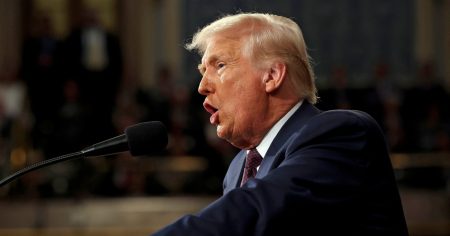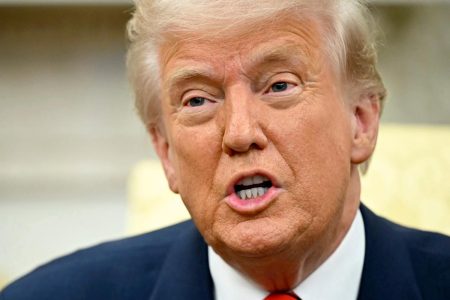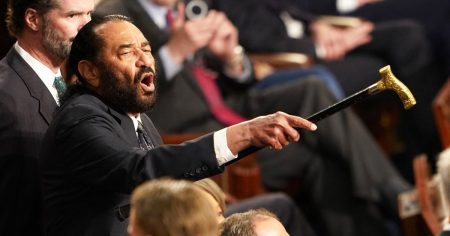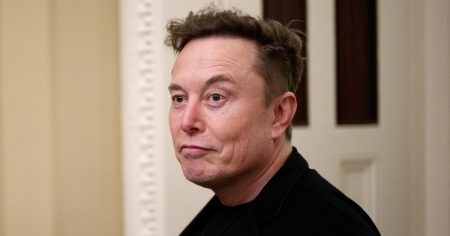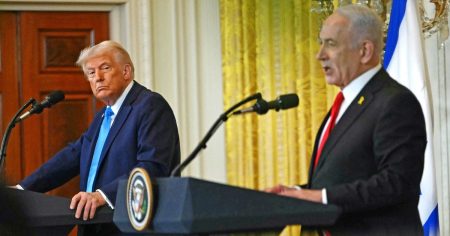President Trump’s Vision for America’s Role in the World
Denying Plans to Invade Canada, but Stirring Conversations About a 51st State
In a recent appearance on NBC News’ Meet the Press, President Donald Trump’s national security adviser, Mike Waltz, dismissed speculation that the Trump administration has any plans to invade Canada. The remarks came in response to reports that Canadian Prime Minister Justin Trudeau had expressed concerns in a private meeting about the Trump administration’s discussions regarding the possibility of Canada becoming the 51st state. Trudeau reportedly told a group of business leaders that the Trump administration “keeps talking about absorbing us and making us the 51st state.” Waltz downplayed the idea of an invasion but acknowledged that many Canadians are dissatisfied with the progressive governance of Prime Minister Trudeau. “Really, what you’re seeing is a reassertion of American leadership in the Western Hemisphere,” Waltz said, emphasizing Trump’s focus on regions ranging from the Arctic to the Panama Canal.
A Broader Vision for American Leadership in the Western Hemisphere
Waltz’s comments reflect a larger strategy by the Trump administration to reassert American influence in its own backyard. He highlighted Trump’s interest in regions such as Greenland, Arctic security, and the Panama Canal, suggesting that these areas are critical to U.S. interests. Trump himself has previously floated the idea of annexing Greenland, a notion that has been met with skepticism internationally. Similarly, the president has expressed a desire to regain control of the Panama Canal, a symbol of American power in the early 20th century. Waltz argued that the U.S. has neglected its own hemisphere for too long, emphasizing the region’s vast resources, including energy, food, and critical minerals. This vision of reassertion is central to Trump’s foreign policy agenda, as he seeks to project American strength on the global stage.
Budget Cuts and Efficiency: Trump’s Plan to Streamline Government Spending
In addition to his foreign policy ambitions, Trump has been vocal about his plans to cut government spending and improve efficiency. Waltz discussed the aggressive budget cuts already made by the administration, particularly within the Department of Defense (DOD). He criticized the DOD’s $800 billion-plus budget, saying that “everything there seems to cost too much, take too long, and deliver too little to the soldiers.” Trump has tasked Elon Musk, head of the Department of Government Efficiency, with identifying wasteful spending in federal agencies, starting with the Department of Education and later moving on to the military. Musk’s involvement has raised eyebrows, but Waltz defended the move, stating that “all of the appropriate firewalls will be in place” to ensure accountability. Trump himself expressed confidence in Musk’s ability to root out fraud and abuse, saying, “He’s not gaining anything. In fact, I wonder how he can devote the time to it. He’s so into it.”
Cutting Back on Humanitarian Aid: A Shift in Foreign Assistance Strategy
The Trump administration has also taken aim at U.S. foreign aid programs, particularly the U.S. Agency for International Development (USAID). Over the past two weeks, Musk and other officials have sought to slash jobs and funding at USAID, citing inefficiencies in how aid is distributed. Waltz defended these cuts, arguing that the agency often pursues initiatives that do not align with the president’s foreign policy vision. He pointed out that only a small fraction of aid actually reaches those in need, with the rest being absorbed by contractors and bureaucratic overhead. However, Waltz denied that reducing humanitarian aid would cede influence to rival powers like China and Russia. Instead, he emphasized the need to “realign their mission” to better reflect Trump’s foreign policy priorities.
Shifting the Burden of Ukraine Support to Europe
On the issue of Ukraine, Waltz reiterated Trump’s commitment to ending the war but suggested that the financial burden of supporting Ukraine should ultimately fall on European nations. He noted that Trump plans to “recoup” the cost of military assistance to Ukraine by forming partnerships with the country in areas such as natural resources, rare earth minerals, and energy. Once the war is over, Waltz said, European nations will “have to own this conflict” and take on greater responsibility for security guarantees. This approach reflects Trump’s broader philosophy of burden-sharing in international alliances, a theme he has also emphasized in relations with NATO.
Trump’s Philosophy of Leadership and Governance
At the heart of these policies is Trump’s philosophy of reasserting American leadership and prioritizing domestic interests. Whether it’s renegotiating relationships with neighbors like Canada, streamlining government spending, or recalibrating foreign aid, Trump’s vision is centered on making America more competitive and influential on the world stage. While these ideas have generated significant debate, Waltz and other administration officials argue that they represent a necessary shift in how the U.S. engages with the world. As Trump continues to implement his agenda, the impact of these policies will likely shape American foreign and domestic policy for years to come.



